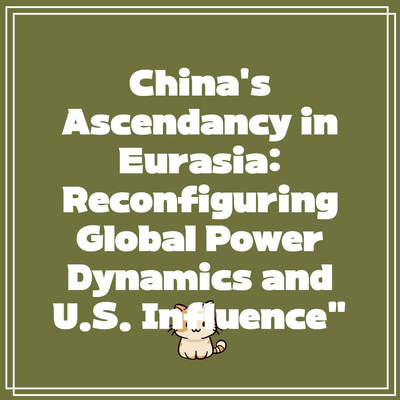
The Rise of China in Eurasia: Implications for U.S. Global Influence
The dynamics of global power politics have witnessed significant shifts in recent years. One of the most prominent changes is the increasing strength of China, particularly in the context of Eurasia. This region, characterized by its vast geography and diverse political landscapes, has become a focal point for international relations. As China asserts its influence, many analysts ponder whether this heralds a decline in the global dominance of the United States.
China’s Expanding Influence in Eurasia
China has made profound inroads into Eurasia through initiatives like the One Belt One Road (OBOR) project, which aims to enhance trade and infrastructure connectivity across Asia and beyond. This ambitious plan is expanding China’s economic and diplomatic footprint, fostering relationships with various countries along the Silk Road. Investments in rail networks, ports, and energy infrastructure are becoming the backbone of China’s strategy to weave a web of influence stretching from Europe to Asia.
The country’s investment in these regions not only boosts local economies but also positions China as an essential partner for many nations looking to develop their infrastructure. This shift indicates a rising preference for Chinese collaboration over Western alternatives, particularly as many countries feel left behind by U.S. foreign policy that often emphasizes security over economic partnerships.
The United States’ Response to China’s Rise
In reaction to China’s growing presence, the United States has taken steps to reassert its influence in the region. Initiatives such as the Free and Open Indo-Pacific strategy aim to counterbalance China’s reach by strengthening partnerships with allies like Japan, India, and Australia. However, many argue that these efforts are often reactive rather than proactive, struggling to keep pace with China’s rapid expansion.
The U.S. faces the challenge of transforming its role in an increasingly multipolar world where China is determined to reshape the global order. Economic tensions, particularly trade disputes and technology races, further complicate the landscape. Analysts highlight that U.S. policymakers need a coherent strategy that not only addresses security concerns but also promotes sustainable economic partnerships.
Perceptions of U.S. Decline
As China’s capabilities grow, so do the perceptions of American decline. Numerous commentators have illustrated this narrative by citing the economic struggles within the U.S. and its current political discord. The effectiveness of U.S. leadership on the world stage is being scrutinized, especially as China presents itself as a viable alternative for countries seeking partnerships.
Furthermore, China’s successful handling of major global challenges, such as infrastructure development in Africa and investments across the Middle East, has led many emerging economies to view it as a more reliable partner than the U.S., which is often seen as preoccupied with its domestic issues.
Global Implications of China’s Ascendancy
China’s rise poses significant implications for international relations and global governance. With its expanding influence, nations might start recalibrating their foreign policies, gradually pivoting toward Beijing. This shift may lead to a new set of geopolitical realities, characterized by alliances redefined and power balances upset.
Moreover, China’s approach to internationalism, which emphasizes non-interference and mutual development, contrasts sharply with the U.S. model of interventionist foreign policy. Countries may gravitate towards a framework that prioritizes their economic interests over political ideologies, which could further diminish U.S. influence.
Conclusion: Navigating the New Global Order
The rise of China in Eurasia undoubtedly challenges U.S. hegemony and raises questions about the future of global power dynamics.
In the end, the interaction between these two great powers will shape the 21st century, influencing global trade, security, and diplomacy. As nations navigate this new terrain, it will be crucial for both the U.S. and China to engage in constructive dialogue and partnership, ensuring that a balance of power can contribute to a more stable and prosperous world.


